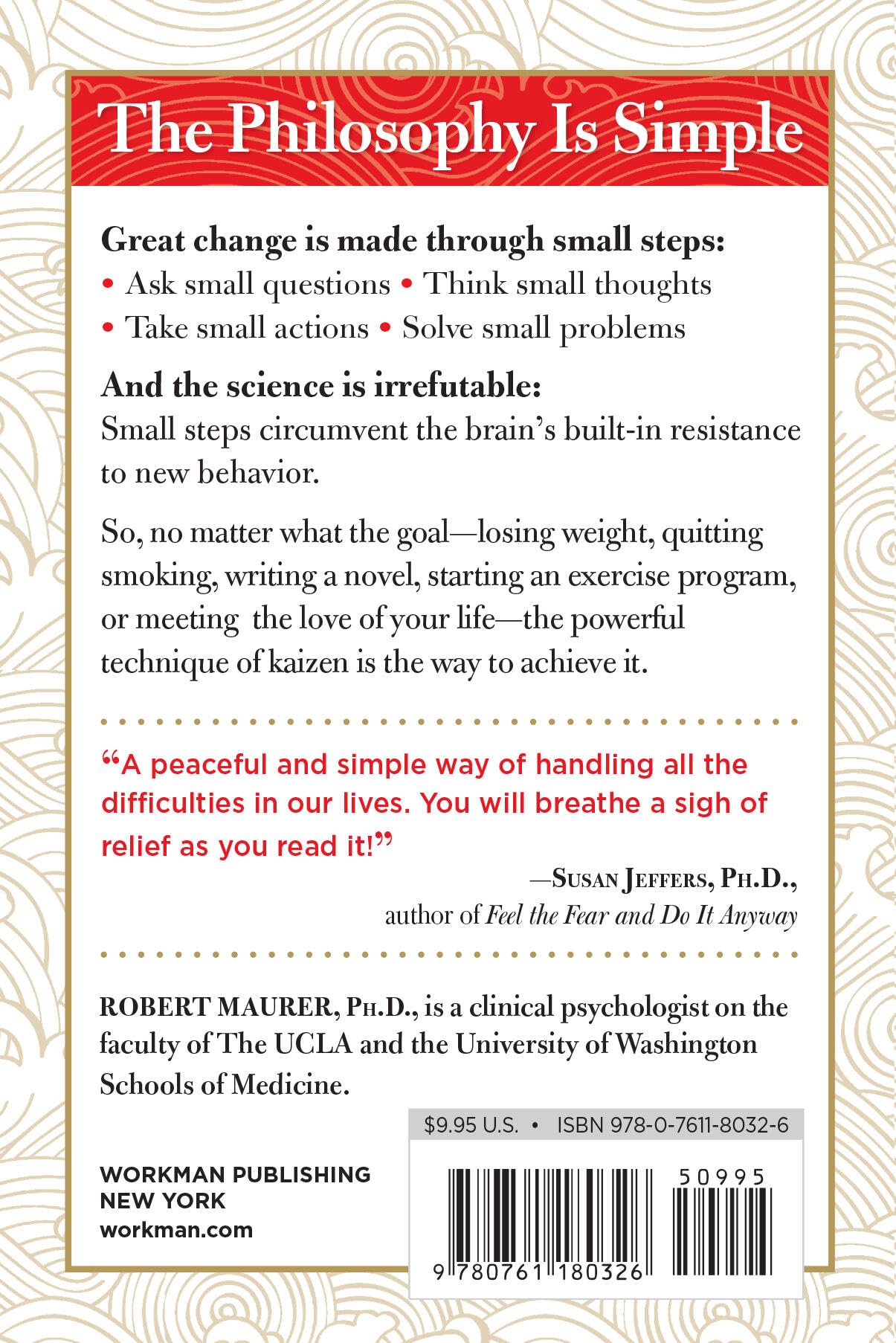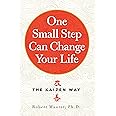





One Small Step Can Change Your Life: The Kaizen Way Paperback – April 22, 2014
Description
Full description not available

Reviews
M**N
Fascinating application of management ideas to your own life
While doing research for my upcoming book "Healthcare Kaizen: Engaging Front-Line Staff in Sustainable Improvements," I found two books that touched on kaizen-style continuous improvement in our everyday lives -- one was this book with a more intensive and clinical look at kaizen, One Small Step Can Change Your Life: The Kaizen Way by Robert Maurer PhD, a professor of behavioral sciences at UCLA.I finally read all of Maurer's book, in one sitting while traveling late last year, and I really enjoyed it. I'd like to share a formal review here.Maurer, in introducing kaizen (translated from Japanese as "continuous improvement"), cites the original Training Within Industry program, Dr. W. Edwards Deming (Maurer's initial exposure to the principles of kaizen) and Toyota's Taiichi Ohno and he describes the impact this approach had for Toyota and others in industry. Maurer, in his book, is translating and adapting kaizen principles to issues in the realm of clinical counseling and his patients, with problems including:Wanting to quit smokingNeeding to exercise moreDesiring to eat betterWanting to floss dailyBecoming more appreciative of one's spouseIronically, there are some lessons from the clinical realm that we can, I think, bring back to the workplace.Maurer writes of Julie, a patient who wanted (needed) to exercise more. Traditional advice would be to ask her to launch immediately into some big fancy exercise program that, since it seemed overwhelming, might not even get started (or might not sustain) -- sounds familiar to big programmatic approaches to workplace improvement, right?Maurer's advice:"How about if you just march in place in front of the television, each day, for one minute?"Maurer writes about how the human brain, the prehistoric part called the amygdala, is programmed to exhibit a "fight or flight" response. When this happens, our higher-level cognitive thinking is shut off. This is a helpful survival instinct when we are in real physical danger, but it's less helpful when this response is triggered by a change or a new situation at work or in our daily life.Maurer suggests that small baby steps changes, as we use in workplace kaizen, circumvent the amygdala because small changes aren't overwhelming or scary. He asked Julie to just march one minute... and then the entire commercial break, then two. Eventually, Julie was exercising for extended periods of time.From the book:I noticed that Julie's attitude had changed. Instead of coming back discouraged, as so many failed exercisers do, Julie was more animated, with less resistance in her speech and demeanor....and his patients would say:"The steps were so small I couldn't fail!"Maurer suggests a similar path when trying to cut out sweets from your diet. Instead of going "cold turkey," break off the first bite and throw it in the trash. You are taking a positive first step to weaning yourself off of candy. Combined with positive thoughts and encouragement, these baby steps can lead to larger, sustained changes.Rather than fighting our nature, Maurer suggests we embrace our natural reactions:"During the rough patches, understanding that fear is normal, and a natural sign of ambition, makes us more likely to hold on to hope and optimism-qualities."Now you might be thinking that small gradual improvements are fine, but we also need innovation (a trendy business buzzword). Maurer says there is certainly a place for larger innovation, but we also need smaller continuous improvements. That's a theme that is consistent with our Healthcare Kaizen book.Maurer writes that the reason behavioral kaizen works is that:kaizen approach is a highly effective method of building new neural connections in the brain...What is a new workplace habit, related to Lean or otherwise, that you have wanted to start, but you didn't because it seemed too overwhelming? Let's say your Lean consultant said you need to do an hour-long Gemba walk every day. You don't have time for that... so it doesn't happen and you get discouraged. It's easier to be resigned to saying, "See, Lean won't work here."But what if you followed the Maurer kaizen path and started with a 5-minute gemba walk. That's easier to squeeze into your day, perhaps. Start small, reinforce the behavior, and you might gradually start enjoying the gemba walks to the point when you are now making time to make them happen.Maurer also has tips and lessons about rewiring one's brain for kaizen and changes, including leading yourself and others by asking small questions, such as "What's the smallest step I can take to be more efficient?", learning to practice this habit in a kaizen style by starting small...The author shares key positive questions we can ask ourselves, including:If I were guaranteed not to fail, what would I be doing differently?And, if you're trying to reach a goal (personal or workplace related):What is one small step I could take toward reaching my goal?To work toward successful change in the personal realm, Maurer also writes that we need to unlearn some deeply engrained notions, including the cultural teachings, including:"...change must always be instantaneous, it must always require steely self-discipline, and it must never be pleasurable.""self-reliance is a frequently used but very poor strategy for coping with life's adversity. That's because we are biologically "wired" to reach out for support when we're stressed; it's in our nature."Later in the book, Maurer creates an interesting twist, as the kaizen principles (originating in the workplace) are brought BACK into the workplace, as he described how staff at a medical clinic really turned around their operations and became successful through these same ideas he had used with his patients. It all comes full circle.Maurer also makes a great case for how we start, with kaizen, by learning how to see and address little problems. Then, we are able to see and fix larger problems. I know that has been the experience in hospitals that are using kaizen methods. We write a lot about small problems and small improvements in our book, but that's the starting point. There will always be little problems even as we start fixing the bigger, more systemic stuff.All in all, I found this an enjoyable and thought-provoking read - for my personal life and in the professional realm. I'm not big on "self help" books, but Maurer's translation of kaizen to the personal realm was a fresh take on continuous improvement. There are ideas in this book that we can all apply to our New Year's resolutions or other improvements we hope to make.
N**I
Good but not life-changing
This is a small pocket-sized book that introduces the concept of using the Japanese-coined "Kaizen" or small steps to achieve great things. The central point is that you can bypass your brain's natural fear of things by taking small steps to accomplish more. It's a good idea, but it almost seems like the author is using "Kaizen" in the same way you would use a world like "Tao" or "Zen," that there's a whole school of thought here, or volumes written about it, and there isn't.Simultaneously there are some good principles that everyone can take advantage of in this book. With that said I don't necessarily agree with the author that taking small steps is the best way to stimulate change. Sometimes taking massive action is the shock your system needs to force you in the right direction. For a chronic alcoholic I think personal revelation is going to be a stronger remedy than just drinking a little bit less everyday. But with that said, as a pocket-sized introduction to the concept it works fine, I just wish the author had maybe tied it in with a few other things instead of just creating a gimmick around "Kaizen" as the be-all end-all of personal change. It certainly is not that.
K**O
That it is really one small step. Not hard to make the change I want..
This book written in simple easily understandable English. Hilarius stories makes it easy for me to remember. I loved this book!!!
T**R
Phenominal but Easy Technique for Improving your life - Self-Help
In reviewing the essential guide to Kaizen—the Art of Making Great and Lasting Change through small, steady steps, I found the author’s contention of the Kaizen principle very effective. Maurer is the Director of Behavioral Sciences for the Family Practice Residency Program in Spokane, Washington, and a faculty member of the UCLA School of Medicine and the University of Washington School of Medicine. Much of what is in the book apparently comes from years of experience from these locations. The book itself is basically about change; changing something inside you or your environment, but do so in very small steps. This principle is known as Kaizen, the Japanese word for improvement. It’s a technique first developed around World War II. Maurer begins the book discussing background of the principle and where it was first used. He expounds on how the Japanese applied it to the rebuilding of the country after the war which ultimately led to modern process improvements in manufacturing and elsewhere. Maurer then delves into the exactly how it works including parts of the brain and where the changes respond from that make it successful. Along the way he cites many real cases of patients where Kaizen was successfully used. As I continued reading, I discovered Maurer, builds on the previous chapter from small thoughts to actions, to solving small problems and rewarding oneself for doing so. All of this involves the same Kaizen technique so there were no real surprises from the reading. He finally closes with applying Kaizen lifelong. First, I do buy in to the principle as he outlined in the book. Reading through many of the personal stories, I felt like I could relate and indeed have achieved Kaizen unknowingly throughout my life. I’ve had some formal training in another Japanese technique known as LEAN and have found myself following that practice in everyday activities. The same is true of Kaizen. Life has become very complex for most individuals there is so much multitasking and activities bombarding the everyday person that it’s no wonder suicides are up and drug use is at an all-time high. For this reason, many people choose to do nothing at all to change themselves or their lives. Instead, I would propose they follow the steps in this book. Start small, make just one subtle change – sometimes in your mind for several days or weeks before actually physically doing it. For example, Maurer discusses exercise and the lack thereof that people have. He would say to start by just standing on a treadmill for one minute every day, then over the course of weeks, increase that activity until one actually begins walking on it. The ley is, the brain responds to this and won’t try to resist. I think overall, it’s a great read and should one choose to practice Kaizen, will almost assuredly gain from it. I plan to begin myself and will get copies for friends at Christmas.
Common Questions
Trustpilot
3 weeks ago
1 day ago



